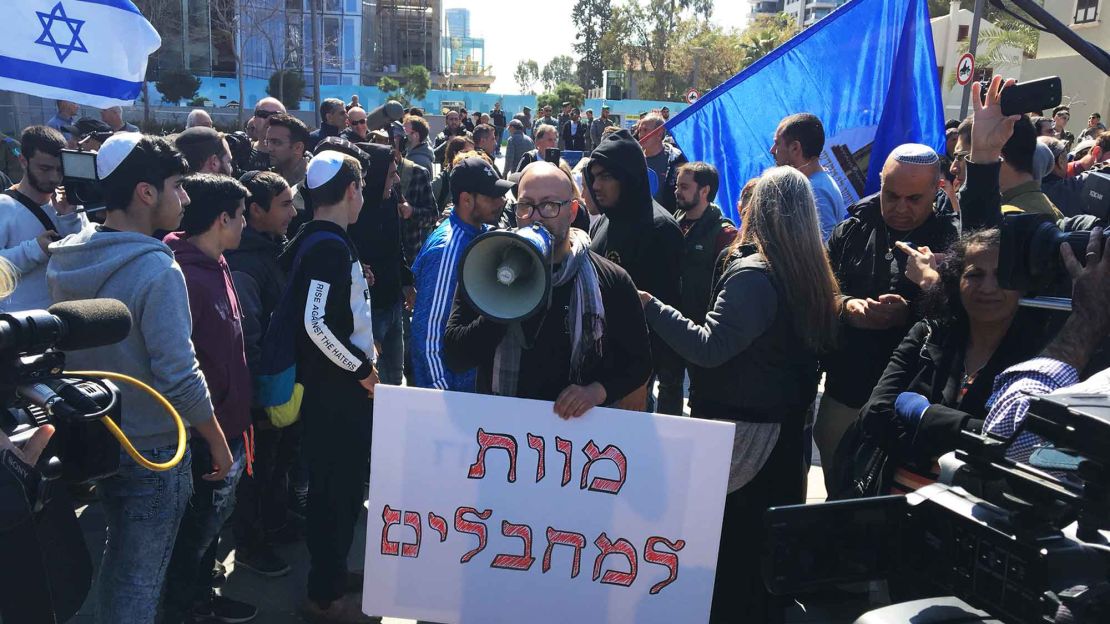Story highlights
Azaria also given 12-month probation and demoted to private
Israeli soldier convicted of manslaughter last month
Sgt. Elor Azaria, the Israeli soldier convicted of manslaughter in the fatal shooting of a wounded Palestinian assailant, was sentenced to 18 months in military prison Tuesday.
The Palestinian, Abdel Fattah al-Sharif, 21, was one of two men accused of stabbing another Israeli soldier in the West Bank city of Hebron in March.
Charges were brought against Azaria after video footage emerged showing him shooting Sharif in the head as he lay on the ground, injured and already subdued. The second Palestinian suspect had already been shot dead.
The judge announced Azaria will be demoted to the rank of private, and handed him a 12-month probation on top of his prison sentence.
A spokesperson for the Israel Defense Forces explained that the time Azaria has spent in open detention will not count towards his 18-month sentence, which he will begin serving in 12 days time.
The spokesperson also confirmed that Azaria has the right to an appeal.
Abu Al-Abed Al-Sharif, the father of the Palestinian, said he did not expect the court to have treated the case so fairly.
“We didn’t expect an Israeli court to be fair with Palestinians, the only reason for this is having this crime recorded on a camera,” he told CNN.
Division
Approximately 150 protesters gathered outside the Ministry of Defense in Tel Aviv, where the military court is located, as the sentencing commenced.
A number of right-wing activists supporting Azaria were present with banners.
One protestor held up a banner saying “Death to Terrorists.” Another banner read: “The people of Israel support and salute the hero soldier Elor Azaria.”

Naftali Bennett, minister of education and head of the right-wing Jewish Home party, called for an immediate pardon.
“The security of the citizens of Israel requires immediate pardon for Elor Azaria who was sent to defend us,” Bennett wrote on Twitter.
He added: “The process was polluted. It is forbidden for Elor to sit in prison, for all of us will pay the price.”
The case
The case against Azaria has divided opinion among the Israeli public, politicians and members of the military, and focused attention on the military’s code of ethics.
The incident took place while Azaria was serving in Hebron, a largely Palestinian city in the West Bank with a small population of Israeli settlers. The Israeli soldier who had been attacked suffered a minor injury.
According to the Israel Defense Forces, Azaria arrived at the scene approximately 11 minutes after the attack, cocked his rifle and shot Sharif in the head, killing him.
Azaria denied the charges against him, but a three-member panel of military judges was unanimous in finding him guilty of manslaughter and improper conduct.
At the heart of the case was the motivation for Azaria’s actions. The soldier’s defense argued he felt his life was in danger, while the prosecution contended he was motivated by vengeance.
That defense was rejected by the judges.
The head judge, Col. Maya Heller, stated that Azaria was an “unreliable” witness and that his defense witnesses were also problematic. She called the shooting “needless.”
Inside the court
During sentencing, Col. Heller said the court took mitigating circumstances into account, acknowledging the incident took place “in hostile territory” while taking “note of the harm suffered by his family.”
But according to the Foreign Press Association, she also stated that Azaria had not expressed any remorse for his actions.
Imad Abu Shamsiyeh , the activist who filmed the incident, told CNN that the sentencing was “full of injustice.”
“It gives the legitimacy of killing more Palestinians with cold blood, only because they look suspicious,” he added.
The verdict was welcomed by Human Rights Watch.
“Sending Elor Azaria to prison for his crime sends an important message about reigning in excessive use of force,” said Sari Bashi, Israel and Palestine Advocacy Director at Human Rights Watch.
“But senior Israeli officials should also repudiate the shoot-to-kill rhetoric that too many of them have promoted, even when there is no imminent threat of death.
“Pardoning Azaria or reducing his punishment would only encourage impunity for unlawfully taking the life of another person.”
CNN’s Oren Liebermann and Amir Tal reported from Tel Aviv. Abeer Salman reported from Jerusalem. James Masters wrote from London. Victoria Eastwood contributed to this report.

